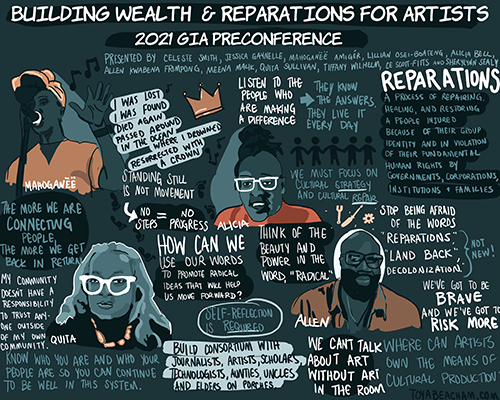Support for Individual Artists
GIA members have been working together to promote and improve funding for individual artists for over 20 years. The Support for Individual Artists Committee has been one of the most active groups of funders within GIA. Over the years, the committee has been an incubator for such projects as a scan of scholarly research on artist support, a visual timeline outlining the history of artist support funding, major publications, and programs, and the development of a national taxonomy for reporting data on support for individual artists. The committee continues to advise, inspire, and inform GIA’s thought leadership and programming in support for individual artists.
Click here to listen to the latest podcast, and see below for resources.
From The Pew Center for Arts & Heritage: When it comes to the distinctive artistic practices and creative challenges that drive today’s artists, our Pew Fellows have a wealth of insights, representing a diversity of perspectives across age, background, and creative disciplines.
Read More...From Whippoorwill Arts: In 2020, we embarked on multi-phase research efforts with these guiding questions in mind: All with a focus on live performance - something no new technology will ever replace - also the main source of income and a fulfillment of deep desire for working musicians.
Read More...From New England Foundation for the Arts: The New England Foundation for the Arts (NEFA) today released a comprehensive evaluation of the National Theater Project (NTP).
NTP functions as a full system of support for devised theater, which in addition to funding, animates an informed, interactive network of producing theaters, presenters, and ensembles. Since the first round of NTP grants in 2010, NEFA has infused over $11 million into the field through the program. To date, 96 new theater works have been supported through Creation and Touring grants; touring of those works has reached 43 different states across the U.S. NTP projects have toured in-person and virtually to large and small arts presenters, military bases, universities, regional theaters, and festivals.
Read More...From Helicon: Artists have specialized skills and capacities, but their basic needs are not unique. They need stable and affordable housing; access to health care and unemployment insurance; time off when they are sick or have a family crisis; fair wages; legal protection from exploitation; and opportunities and resources to turn their ideas into reality.
Read More..."The Kenneth Rainin Foundation co-hosted the pilot for a new series, 'Let’s Talk,' in partnership with Bay Area artist Beatrice Thomas of Authentic Arts & Media in December. Over fifty artists, arts workers and funders joined us for our first event to examine the central question: what do artists need to thrive? Below I recap the talk and what we learned, and share upcoming session dates for 2023."
"The goal of the “Let’s Talk: What Artists Need To Thrive” series is for the Foundation’s Arts Team to engage in meaningful dialogue and be more accessible and transparent, especially with artists who have historically been unacknowledged by or excluded from philanthropy. We will apply what we learn to improve how we advance equity and support diverse, visionary Bay Area artists."
Read More...On Thursday, August 25, 2022, the Support for Individual Artist Committee hosted a presentation and discussion led by Randi Berry, executive director, IndieSpace, and Brea Clemons, former programs manager, indieSpace. The Committee’s 2022 thematic focus was mental health and health care for artists and arts administrators. As such, the monthly discussions centered how the Committee, as stewards of wealth, could better support artists’ needs, as well as self-care within members’ institutions.
Read More...For our March 2022 Member Spotlight, we feature Art Matters and their Artist2Artist program, piloted in 2021, where grant recipients — artists — act as grantmakers. There were no applications, no panel, and the Board held no veto power beyond familial conflicts of interest. This evolving horizontal model of granting was created to affirm artists’ specialized knowledge of their communities and reduce the labor typically required for artists to access funding for their practices.
Read More..."In a sentence: The dance funding ecosystem is small compared to other performing arts, and the impacts of the pandemic on top of decades of declining public funding mean a growing role for philanthropy," reports Inside Philanthropy in their State of American Philanthropy report.
Read More..."The Open Society Foundations are proud to announce their Justice Rising Awards, a new investment in leaders working towards racial justice and equality in the Black community in the United States," according to the press release. "The 16 awardees from across the country are being recognized for their long-term contributions to advancing change in their communities, tireless commitment to civil rights, and capacity to inspire, innovate, and mobilize people despite considerable odds."
Read More...
